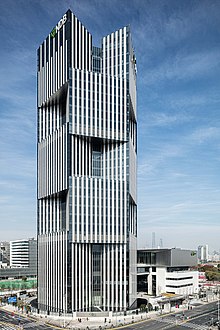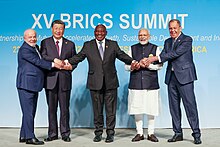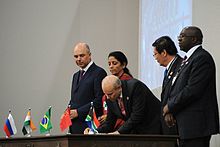BRICS
BRICS is an intergovernmental organization consisting of ten countries—Brazil, Russia, India, China, South Africa, Egypt, Ethiopia, Indonesia, Iran and the United Arab Emirates.
In a 2021 article for Project Syndicate he wrote that the BRICS countries "have so far proven incapable of uniting as a meaningful global force" and felt in 2024 that "each year also brings further confirmation that the grouping serves no real purpose beyond generating symbolic gestures and lofty rhetoric".
[31] The BRIC group's first formal summit, also held in Yekaterinburg, commenced on 16 June 2009,[32] with Luiz Inácio Lula da Silva, Dmitry Medvedev, Manmohan Singh, and Hu Jintao, the respective leaders of Brazil, Russia, India, and China, all attending.
[38] At the 2011 BRICS summit in Sanya, China, South African president Jacob Zuma represented the country as a full member for the first time.
[42] In March 2013, during the fifth BRICS summit in Durban, the member countries agreed to create a global financial institution to cooperate with the western-dominated IMF and World Bank.
China, which held the world's largest foreign exchange reserves and contributed the bulk of the currency pool, wanted a more significant managing role.
[45] In October 2013, Russia's Finance Minister Anton Siluanov said that creating a $100 billion in funds designated to steady currency markets would be taken in early 2014.
[55][56] In July 2023, the Russian president announced that he will not personally attend the BRICS summit in Johannesburg on 22–24 August despite good relations with the South African government.
Russian news channels noted that Putin will remotely participate online in all BRICS leaders' sessions, including its Business Forum, and also deliver his remarks virtually.
[58] In August 2023, at the 15th BRICS Summit, South African President Cyril Ramaphosa announced that 6 emerging market group countries (Argentina, Egypt, Ethiopia, Iran, Saudi Arabia, and the United Arab Emirates) had been invited to join the bloc.
[59][60][61] However, the Argentine general election in November 2023 led to a change in president to Javier Milei, who had committed to withdraw the country's membership application.
Jakarta's bid got the green light from the bloc in 2023, but the Southeast Asian country asked to join following the presidential election held in 2024.
[82] Brazil, India, and China are among the world's ten largest countries by population, area, and gross domestic product (GDP, nominal and PPP).
[121][122][123] In August 2023, at the 15th BRICS Summit, South African President Cyril Ramaphosa announced that Argentina, Egypt, Ethiopia, Iran, Saudi Arabia, and the United Arab Emirates had been invited to join the organization on 1 January 2024.
[139] While Egypt, Ethiopia, Iran, and the United Arab Emirates were not admitted as members during the 15th BRICS summit, they were among 22 countries applying for membership.
[168][169] Western analysts have highlighted potential divisions and weaknesses in the grouping, including significant economic instabilities,[170][171][172][173] disagreements among the members over UN Security Council reform,[174] and India and China's disputes[175] over territorial issues.
[179] In 2014, the Indian Marxist author Vijay Prashad raised the limitations of the BRICS as a political and economic "locomotive of the South" because they follow neoliberal policies.
"[181][182] Ashok Malik comments that BRICS, amid new members and partners, India should ensure the group doesn't get an "distortionary ideological edge".
[91][186] Indian diplomat Meera Shankar noted "the new payment systems discussed in BRICS are still in the exploratory phase and do not pose a challenge to the dominance of the US dollar in the medium term.
[168] In a briefing in October 2024 Russian Foreign Ministry Spokeswoman said that "BRICS framework is non-confrontational and constructive", and that "it is a viable alternative to a world living by someone else's, alien rules".
[194] In an October 2024 interview to The Times of India, President Zelensky said that the Kazan summit was a total failure, for example, Brazil was not present at leader level.
[196] On 9 April 2013, Isobel Coleman, a director at the American think tank Council on Foreign Relations, and later U.S. representative to the UN, claimed that the BRICS members share a lack of consensus.
She also claimed that the significant difference in GDP influences the reserves: China accounts for over 41% of the contribution, which in turn leads to its bigger political say within the association.
[197] A multi-year study at Tufts University published in July 2023 found that the "common portrayal of BRICS as a China-dominated group primarily pursuing anti-U.S. agendas" was misplaced.
The study asserted: "The BRICS countries connect around common development interests and a quest for a multipolar world order in which no single power dominates.
[198] According to the Atlantic Council's Thomas Hill in December 2023, the de-dollarization efforts within BRICS, particularly in North Africa, present a significant challenge to US interests.
[167] Replacing the dollar could limit the US's ability to run deficits and maintain low interest rates, and undermine the effectiveness of US sanctions and SWIFT.
[206] Melissa Pistilli writes that at the 2024 BRICS summit President Putin seemed to back away from "aggressive calls for de-dollarization [...] but rather to deter the "weaponization" of the US dollar".
[209] BBC assesses BRICS' US dollar reliance decrease projects as "likely aren't viable, because many member states' economies cannot afford to wean themselves off of it.
"[210] According to a Gallup International poll conducted between October and December 2023, almost a third of people around the world had never heard of BRICS but Western countries were much more negative towards the alliance than elsewhere.
























